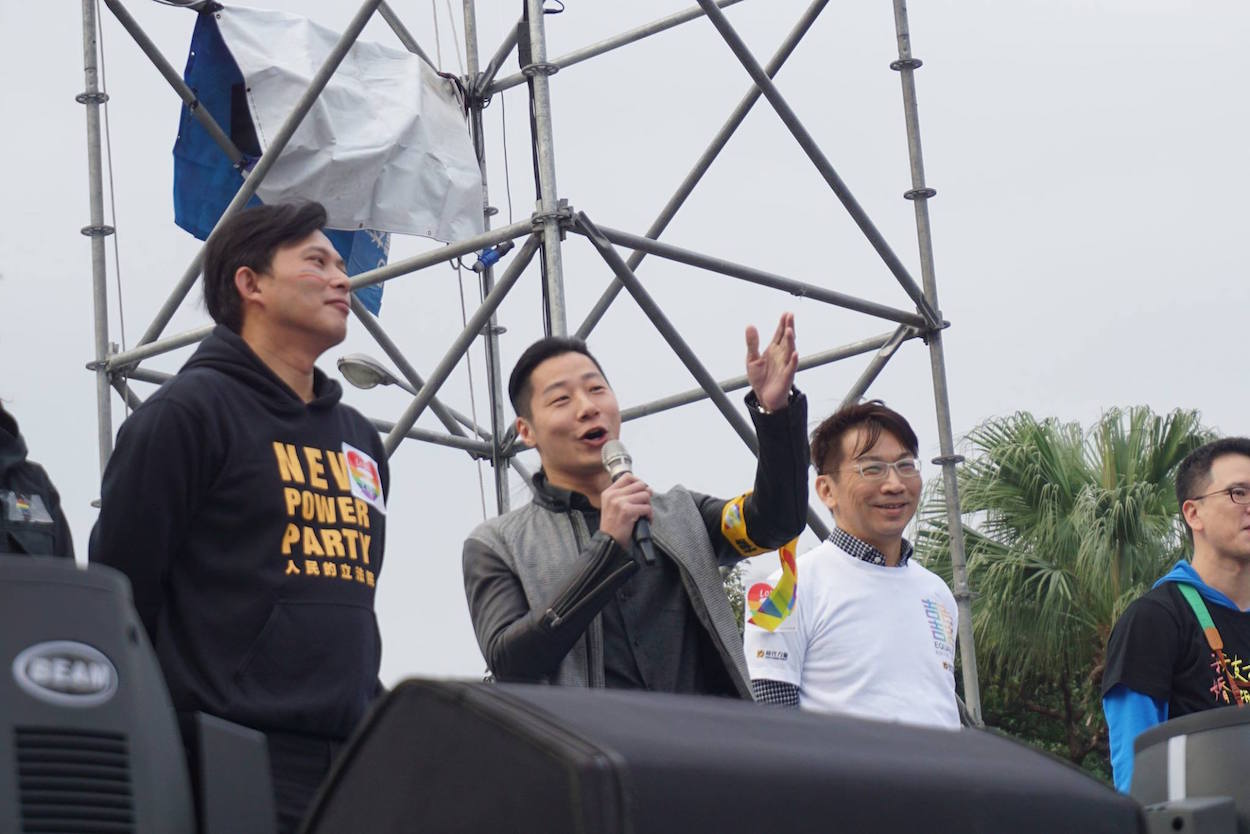by Brian Hioe
語言:
English
Photo Credit: New Power Party
AN IMPENDING SPLIT between the DPP and NPP, uneasy frenemy parties within the pan-Green camp, may be underway with recent attacks on the NPP by DPP majority speaker Ker Chien-Ming. Ker has come under fire from the NPP because of his practice of conducting cross-caucus negotiations with the KMT, which the NPP sees as secretive and unaccountable in nature. In turn, Ker has accused the NPP of the same practice for attempting to arrange a private meeting with Tsai Ing-Wen regarding hotly contested labor reforms which were passed into law last month.
Much of Taiwanese youth activism, which the NPP originates out of, disapproves of cross-caucus negotiations conducted behind closed doors, seeing them as lacking transparency and a sign of how the DPP does not necessarily differ so much from the KMT in office. This was a criticism of the DPP that dates back to before the Sunflower movement, even when the DPP did not control the legislative and presidency as it currently does.
Because of his longstanding influence within the Legislative Yuan, and his practice of using cross-caucus negotiations to settle legislative matters, sometimes in close collaboration with former KMT speaker Wang Jinpyng, Ker is an especially hated figure by youth activists, who see him as an emblem of DPP corruption as such. The fact that Ker has led the charge in recent backsliding by the DPP away from Tsai Ing-Wen’s campaign promises to realize marriage equality and towards pushing for “separate but not equal” civil partnerships and was also instrumental in pressing unpopular and hotly contested labor reforms into law has not helped.
 Ker Chien-Ming. Photo credit: VOA
Ker Chien-Ming. Photo credit: VOA
Animosity between Ker and the NPP also returns to 2016 legislative elections, in which political newcomer Handy Chiu of the NPP went head to head with Ker in competing for a legislative seat in Miaoli and eventually lost to Ker, the more experienced politician. That was the only case in which the DPP did not withdraw its own candidate in favor of the NPP for districts in which the NPP fielded a candidate and a NPP candidate went head to head against a DPP candidate.
Yet if it has been a question since then whether the alliance between the DPP and NPP would fall apart sooner, rather than later, perhaps that alliance is on the verge of dissolving. Labor reforms were an issue highly divisive of the DPP and the NPP, with the NPP siding with organized labor groups in opposition to the labor reforms, and Ker lashing out at the NPP with conspiratorial accusations that the NPP organizing labor demonstrations against the DPP from the shadows. Same-sex marriage was another issue, seeing as the NPP took up the mantle of pushing for marriage equality after the DPP reversed course on the issue, sometimes lashing out quite directly at Ker for his perceived role behind the DPP’s change of course. Fights between the DPP and NPP within the legislature on these and other issues, sometimes physical, have not helped with regard to relations between the two parties.
To begin with, it appears to have been the initiative of president Tsai Ing-Wen to collaborate with the NPP during 2016 legislative elections. DPP legislators as Ker and others seem to have less been in favor of the idea, since backing NPP candidates may have led to the DPP getting fewer seats in the legislature than if it just ran its own candidates.
 Photo credit: New Power Party
Photo credit: New Power Party
But the reason as to why the DPP would be willing to cooperate with the NPP during 2016 legislative elections was to make it appear as if the DPP had the mandate of the younger generation of Taiwanese society, after Taiwanese youth activism burst onto the scene from the 2014 Sunflower Movement. With the amount of media attention focused on Taiwanese youth, the last thing the DPP wanted was to appear as geriatric and out of touch with the younger generation as the KMT.
However, the fact is and remains that stalling, backsliding, and outright reversals by the DPP now that it is in office has in many ways allowed for the NPP to eat the DPP’s lunch in front of it. While championing progressive causes as marriage equality or being open to the demands of organized labor during election campaigning, the fact that the DPP was less than willing to take action on some of its campaign promises has allowed the NPP to assume the moral high ground of a party willing to champion progressive causes at all costs, in line with Sunflower Movement political idealism and the NPP’s public image as a party which emerged from the Sunflower Movement. The DPP, however, comes off as having only temporarily assumed the mantle of progressive social causes to gain votes. The disjuncture between the two is strikingly evident in, for example, the NPP making appearances at rallies in favor of marriage equality or labor demonstrations in which few, if any, DPP politicians are present.
 Photo credit: New Power Party
Photo credit: New Power Party
Returning to longstanding criticisms of Ker Chien-Ming and other DPP politicians dating back to before the Sunflower Movement, Taiwanese youth activism was critical of both the DPP and the KMT from the beginning. After a period of alliance with the DPP against the KMT, Taiwanese youth activism and parties emergent from Taiwanese youth activism such as the NPP have returned to being critical of the DPP. But perhaps the backsliding of the DPP is also a sign that Tsai Ing-Wen made too many commitments during election campaigning that she could not fulfill, and that, as is most evident in the DPP’s reversal on marriage equality, not all factions of the DPP may have been on the same page as Tsai when she attempted to steer the DPP towards taking up progressive social causes. At present, Tsai may be facing challenges holding her party in line.
Backsliding or reversals by the DPP could create space for the NPP to grow, seeing as the NPP currently only have five legislators and still could potentially be wiped out in future elections, facing a similar fate to that of the TSU. Nevertheless, the future direction of the DPP remains to be seen, and it also remains to be seen whether the NPP proves politically adroit enough to take advantage of the opportunities presented to it as a result of political recalcitrance by the DPP.

